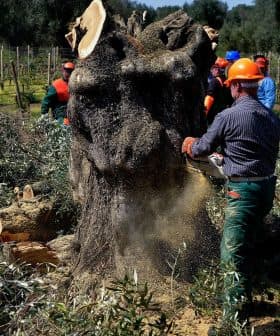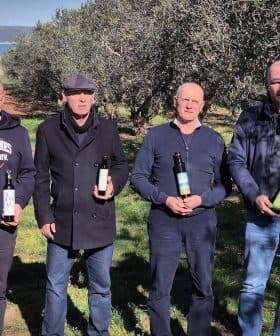Research Explores Olive Oil Co-Extraction with Olive Leaves, Herbs and Spices

A literature review in Foods found that co-extracting olive oil with other bioactive compounds can enhance its health benefits, particularly due to the polyphenols found in extra virgin olive oil. The study by researcher Ítala Marx highlighted the potential for increased antioxidant activity, improved health benefits, and extended shelf life of olive oil through co-extraction methods, but also noted challenges related to extraction conditions, quality control, and cost considerations.
A literature review published in Foods, an academic journal, has found that olive oil co-extracted with other “natural sources of bioactive compounds” could improve the oil’s health benefits.
It is well-established that polyphenols and other phenolic compounds found in extra virgin olive oil are responsible for the vast majority of its health benefits.
This method has the potential to enhance the sensory and chemical quality of extra virgin olive oil and provide additional benefits.
“These properties encompass antioxidant activities, anti-inflammatory effects, cardiovascular benefits, antimicrobial properties and cancer prevention, among others,” Ítala Marx, a researcher at the Instituto Politécnico de Bragança and the University of Porto who authored the review, told Olive Oil Times.
“By increasing the natural antioxidant content in oils, their nutritional value is enhanced, offering additional health-promoting properties to consumers,” she added.
See Also:Health NewsIn the review, Marx investigated ways to increase the amount of polyphenols in the final product to improve its healthy qualities – including the addition of olive leaves or herbs and spices, such as garlic, lemon, hot pepper, rosemary, thyme and oregano – to the milling process.
“It is essential to note that the phenolic content and health benefits of extra virgin olive oil can vary depending on factors such as olive variety, harvest maturity and extraction process,” she said.
“These antioxidants act as radical scavengers, neutralizing free radicals and inhibiting the oxidation process,” Marx added. “By increasing the natural antioxidant content in oils, their shelf life can be extended, reducing the risk of rancidity, and maintaining their quality for a longer period.”
According to Marx, interest in co-extracting olives with other fruits, spices and leaves rich in bioactive compounds has gained significant attention in recent years, with some producers seeing co-extraction as an opportunity for innovation.
“The co-extraction method, also known as simultaneous extraction, involves the extraction of olive oil together with other natural sources of phenolic compounds (in the case of the paper, fresh olive leaves) during the oil production process,” she said.
“This method has the potential to enhance the sensory and chemical quality of extra virgin olive oil and provide additional benefits such as improved health-related composition of oils, enhanced antioxidant activity, enhanced sensory characteristics, and improved nutritional profile,” Marx added.
While a growing body of research has found that co-extraction with bergamot, rosemary, thyme, basil and oregano can increase the oils’ quality and positive sensory notes, these co-extractions cannot be classified as extra virgin due to the addition of other ingredients. Nonetheless, the polyphenol counts are quite high.
“[One study] co-extracted olive oils with garlic, lemon, oregano, hot pepper, or rosemary,” Marx wrote. “The results obtained demonstrated that spices or fruits could increase the antioxidant capacity of oils while their sensory proprieties are promoted.”
In her literary review, Marx mainly focused on co-extraction using olive leaves. She previously co-authored research that found how co-extraction with olive leaves in certain conditions can increase olive oil’s polyphenol content and sensory profile.
In the literary review, Marx said olive leaves may be most suitable for co-extraction since they are a natural byproduct of olive harvesting and must be dealt with post-harvest.
Her research found that between 5 and 10 percent of the overall weight of olives transformed comprises olive leaves, which are already present in the olive milling process.
“Olive leaves have been found to exhibit numerous biological activities, including antioxidant, antihypertensive, cardioprotective, and anti-inflammatory effects,” she wrote. “Additionally, olive leaves contain triterpenoids such as maslinic, ursolic, and oleanolic acids, which recent computational and in vitro studies have shown to possess anti-SARS-CoV‑2 [Covid-19] properties.”
Marx noted that many factors impact the result of olive oil co-extraction with olive leaves, and study results have been inconsistent over the years.
“The cultivar of olives and leaves, the proportion of leaves added, and the scale of extraction are important factors that strongly influence the resultant quality of oils.” she wrote.
Overall, Marz concluded that the development of functionally enriched olive oil could create new types of products and open new markets to producers. Still, future studies must be done to optimize the milling technology to accomplish this and fully understand the potential health benefits.
“The results demonstrated that olive oils co-extracted with natural sources of bioactive compounds could be a promising method to enrich olive oils and promote health benefits for consumers, aiming to meet specific needs,” she wrote.
However, Marx added that while this method has remarkable properties of increasing olive oil’s functional capacity, producers might encounter some challenges while attempting to carry it out.
“Producers need to address challenges related to extraction conditions, sensory characteristics, quality control, regulations, and cost considerations to effectively utilize this method and deliver high-quality extra virgin olive oils to the market,” she concluded.









